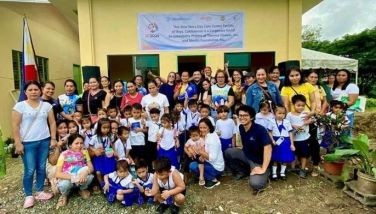Gibo Teodoro and education 1
In his recent interview with Philippine STAR, administration candidate Gibo Teodoro was asked about his platform on education. This is his platform:
“Priorities in improving education: Introduce literacy in preschool in the public sector, including literacy in the mother tongue. We need around P1.5 billion a year for teacher training. Set up special student loan fund under SSS.
“Additional years in grade school and high school: Difficult but there’s no choice. There’s a lot more to learn now. Students cannot absorb all that knowledge in 10 years.
“Free universal kindergarten: If we can provide for that, okay.
“Importance of English proficiency in national competitiveness: It’s really important, but literacy also in the mother tongue. English remains the language of science, technology and diplomacy.
“How to improve national competitiveness: Do away with degree consciousness for promotions. One need not have a master’s degree for leadership skills and institutional knowledge.”
Let us take his ideas one at a time.
About the importance of literacy there is no dispute. Illiteracy is a worldwide problem, and the problem is bad in our country, though not as bad as in a few other countries. There are, however, different kinds of literacies, such as functional literacy, cultural literacy, scientific literacy, information literacy, visual literacy, and multiple literacies. DepEd has defined literacy to mean functional literacy.
Functional literacy is much more difficult to achieve than being able to read and write simple words. UNESCO defines the concept this way: “A person is functionally literate who can engage in all those activities in which literacy is required for effective function of his or her group and community and also for enabling him or her to continue to use reading, writing, and calculation for his or her own and the community’s development.” Being able to read, write, and calculate is only part of functional literacy; more important is the reason one has to read, write, and calculate. A functionally literate person contributes to the development of the community.
Our multi-agency Literacy Coordinating Council has made the definition easier to understand: “Functional literacy is the ability to communicate effectively, to solve problems scientifically, to think critically and creatively, to use resources sustainably and to be productive, to develop one’s sense of community and to expand one’s world view.”
When Gibo says that he intends to “introduce literacy in preschool in the public sector, including literacy in the mother tongue,” he reveals that he has a narrow view of literacy. He thinks that literacy is merely being able to read and write. Within that narrow view, of course, he is absolutely right. Preschool children can definitely read and write in their mother tongue, if their teachers are properly trained and there are reading materials available in their mother tongue. Those are two big ifs, but they are not impossible to achieve, given political will and less corruption.
Taking the larger view of literacy as defined by UNESCO and DepEd, however, we must caution him that the goal of universal literacy for preschool children cannot be achieved within six years of his presidency. Our preschool teachers right now are not trained for literacy work (they still insist on “reading readiness,” for example, rather than actual reading). There are no instructional materials in the various mother tongues for preschool children (except for a handful in Tagalog). To train teachers and to produce instructional materials are two processes that will take more than six years to finish.
In theory, of course, functional literacy can be achieved in preschool. The Institutes for the Achievement of Human Potential were able to make three-year-old children read books (not picture books). The recent fashion of teaching infants sign language has worked miracles for communication between them and their parents. Even critical thinking has been achieved with small children. My three-year-old grandson (excuse a doting grandfather for boasting), for example, was taught by his teachers not only to answer questions beginning with “Why” but to ask them. (By the way, answering questions beginning with “Why” from a three-year-old is not that easy, even for someone with a Ph.D.)
I am glad, of course, that Gibo insists that literacy should be in the mother tongue. One of the causes of widespread illiteracy in our country is the ridiculous attempt to teach children (as well as illiterate adults) how to read in English. Philippine languages, which have words that are usually spelled the way they are pronounced, are much easier to read than English, which has all sorts of silent letters and various ways of pronouncing the same letter. Once a child can read in the mother tongue, reading English is a breeze. This has been proven again and again by all kinds of experiments worldwide, including several in our own country.
Gibo thinks that P1.5 billion is enough for teacher training. He must be thinking of the cascade training model (trainors train trainors who train other trainors who train teachers). That method (a favorite of DepEd) rarely works. With half a million teachers to train, we need a lot more than P1.5 billion to use methods other than cascade, such as the mobile team training model and the simultaneous training model. (To be continued)
- Latest




























